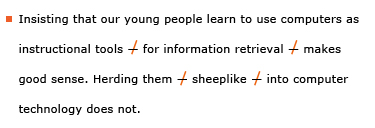The dash
Dashes with parenthetical material for emphasis
A pair of dashes gives prominence to information that is not essential to the sentence but that you want to call attention to. The dashes are stronger marks than a pair of commas or parentheses.


Dashes to set off appositives that contain commas
An appositive is a noun or noun phrase that renames a nearby noun. Nonrestrictive appositives are set off with commas. But when the appositive itself contains commas, a pair of dashes helps readers see the relationships among the sentence elements.

Dash to point toward a concluding element
A dash at the end of an independent clause can point toward and provide emphasis for a list, a restatement, an amplification, or a dramatic shift in tone or thought.




In the first two examples, the writer could also use a colon. The colon is more formal than the dash and not quite as dramatic.
Overuse of the dash
Unless there is a specific reason for using the dash, avoid it. Unnecessary dashes create a choppy effect.

Exercises:
Related topics: